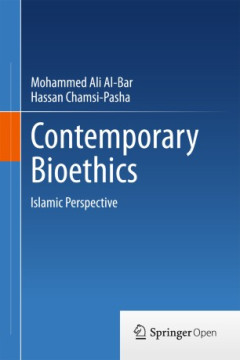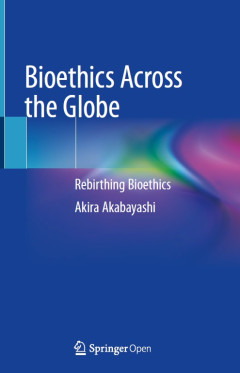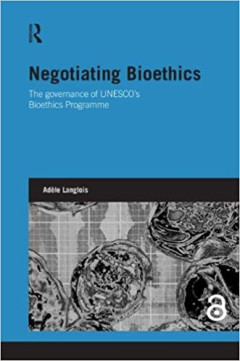Ditapis dengan

Contemporary bioethics :Islamic perspective
This book discusses the common principles of morality and ethics derived from divinely endowed intuitive reason through the creation of al-fitr' a (nature) and human intellect (al-‘aql). Biomedical topics are presented and ethical issues related to topics such as genetic testing, assisted reproduction and organ transplantation are discussed. Whereas these natural sources are God’s specia…
- Edisi
- -
- ISBN/ISSN
- 9783319184289
- Deskripsi Fisik
- xv, 267p. : ill.
- Judul Seri
- -
- No. Panggil
- 297.542 AL c

Bioethics across the globe :rebirthing bioethics
This open access book addresses a variety of issues relating to bioethics, in order to initiate cross-cultural dialogue. Beginning with the history, it introduces various views on bioethics, based on specific experiences from Japan. It describes how Japan has been confronted with Western bioethics and the ethical issues new to this modern age, and how it has found its foothold as it decides whe…
- Edisi
- -
- ISBN/ISSN
- 9789811535727
- Deskripsi Fisik
- xviii, 146p. : ill.
- Judul Seri
- -
- No. Panggil
- 610.1 AKA b

Negotiating bioethics:the governance of UNESCO's bioethics programme
The sequencing of the entire human genome has opened up unprecedented possibilities for healthcare, but also ethical and social dilemmas about how these can be achieved, particularly in developing countries. UNESCO's Bioethics Programme was established to address such issues in 1993. Since then, it has adopted three declarations on human genetics and bioethics (1997, 2003 and 2005), set up nume…
- Edisi
- -
- ISBN/ISSN
- 9780203101797
- Deskripsi Fisik
- xvi, 192 p.
- Judul Seri
- -
- No. Panggil
- 174.2 ADE n

Bioethics And The Holocaust
This open access book offers a framework for understanding how the Holocaust has shaped and continues to shape medical ethics, health policy, and questions related to human rights around the world. The field of bioethics continues to face questions of social and medical controversy that have their roots in the lessons of the Holocaust, such as debates over beginning-of-life and medical genetics…
- Edisi
- -
- ISBN/ISSN
- 9783031019876
- Deskripsi Fisik
- -
- Judul Seri
- -
- No. Panggil
- Public health & preventive medicine
 Karya Umum
Karya Umum  Filsafat
Filsafat  Agama
Agama  Ilmu-ilmu Sosial
Ilmu-ilmu Sosial  Bahasa
Bahasa  Ilmu-ilmu Murni
Ilmu-ilmu Murni  Ilmu-ilmu Terapan
Ilmu-ilmu Terapan  Kesenian, Hiburan, dan Olahraga
Kesenian, Hiburan, dan Olahraga  Kesusastraan
Kesusastraan  Geografi dan Sejarah
Geografi dan Sejarah